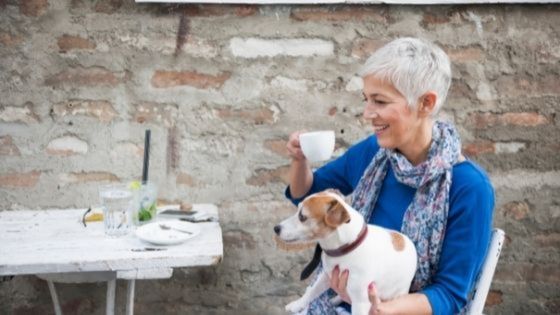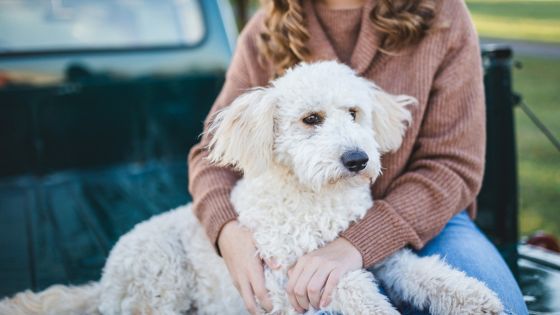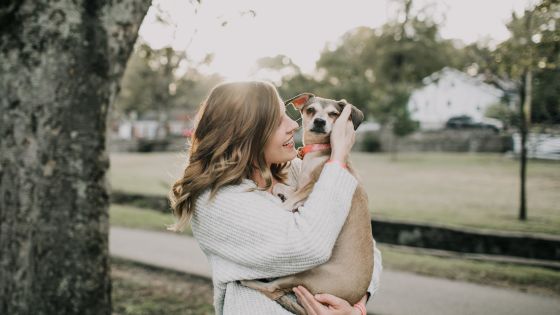It’s impossible to imagine life without our dog isn’t it? They’re so much a part of our hearts and homes, we sometimes even “see” them after they’re gone. I’ll never forget that happening with our dog Bailey. He had a thing for my pup Red so he would follow her down the hall, pin her up against the wall and lick her ear. For weeks after we said goodbye I was sure I saw him walking down that hallway. That picture is just below.

My First Experience Saying Goodbye
In all the years I’ve shared my life with dogs and cats, I’ve never actually done anything to prepare myself for the day when they would no longer be with me. Of course, the thought of them not being here would cross my mind, but only fleetingly. When it came time for me to say goodbye to my much loved heart cat Calypso, the first time I was ever faced with putting an animal to sleep, I had no idea what to expect.
It was quite a few years ago, yet I remember it as if it happened only yesterday. The memory is so vivid I even recall what I was wearing. It was a Sunday, my birthday, and Calypso was barely eating. I called my vet crying and he told me to come down. We knew she had kidney issues for a while – she had been losing weight, not eating as much, so it wasn’t something that happened suddenly but it felt sudden to me. He did blood tests and within 30 minutes we knew her kidneys had failed and nothing more could be done. The tears started pouring down my face, and I literally felt like I was going into shock. The next thing I knew, I was asked to sign a piece of paper with the word “Euthanasia” written across the top in big bold letters. Then it was questions about cremation, burial, urns and I was in a fog. The only thing I knew was that I absolutely had to have her back with me, so the answer was private cremation. I was handed a brochure with urns, I chose a pretty wicker box and then it happened.
My vet was the sweetest most compassionate man you could ever hope to find, which helped so much. He left me alone with her for as long as I needed and I ended up in a heap on the floor.
Being prepared may not spare you from the heartbreak at the end, but I believe it will ensure you and your family make decisions you are happy with and that honour your faithful companion.
We Should all Give it Some Thought
Some time ago a member of my Facebook group, Senior Dog Care Club, asked if any of us knew about biodegradable coffins. My first reaction when I read that post was one of utter shock. I thought “oh my goodness how can you talk about that when your dog is still here?” After reading her replies to the comments I realised she was falling to pieces, and this planning was not only a way for her to ensure she did the best she could for her friend, it was also a coping mechanism.
Preparation Does Not Mean Pain Avoidance
Even if we do everything we can think of to prepare ourselves, we will still mourn and our hearts will still be broken. So why bother? Read on…
Why is Preparation So Important?
There is something known as “anticipatory grief” which is the psyche’s way of preparing for loss. While it is normal, it can impair judgement because the emotions are so powerful it makes it tough to think clearly. That is why end-of life planning should happen before this kicks in.
To learn more about this type of grief ⇒ Understanding Anticipatory Grief: A Guide for Senior Dog Parents

Denial…Not Just a River in Egypt to Quote a Cliché!
Living in the land of denial will not change the sad reality that your dog’s life is coming to an end. What it will absolutely do is cause everyone to suffer, your companion included.
How you ask?
Refusing to accept the truth means you cannot or will not see the signs their health is declining. It also means you won’t be able to make appropriate end of life decisions which are in his best interest, leaving him to linger in pain.
What Does Preparation Entail?
You may be surprised to learn how many issues there are to think about, and comforted by how many decisions you can make in advance. Imagine what an incredible feeling it is, doing all this to ensure you honour the end of your dog’s life as you did every day you shared together. No matter how long or short that time was.
I want to add an important point – sometimes the decisions you make will change due to unforeseen circumstances. For example, you wanted to say goodbye at home but an emergency arose and you had to rush him to the vet. Make your plans, but please accept that sometimes things happen beyond our control, and know at the end of the day you are doing what’s best.
Here are Several Ways to Prepare
Take care of yourself
Do not underestimate or dismiss this very real need to take care of yourself. I know from experience how stressful caring for a sick animal can be, and how that stress can translate into loss of patience and irritability in our dealings with them. Feelings of guilt over raising our voices are normal, as is beating ourselves up about it afterwards. Because our animals so easily pick up on our moods, we can avoid causing them anxiety with some of these suggestions –
- Take a yoga class
- Listen to guided meditation – you’d be surprised how relaxing even 10 minutes can be!
- Go for a swim
- Practice mindfulness
- Take a walk around the block
- Go shopping
- Meet a friend for coffee
- Volunteer
19 Tips for Caring for Yourself While Caring for a Sick Dog
Caring for a Senior Dog: Recognizing and Overcoming Caregiver Burnout
Talk to your children
It’s important to explain to your kids what’s going on and to be as truthful as you can, given their age and level of maturity. Please do not lie and tell them Max ran away or is lost. Of course the urge to protect them from the sadness is a natural response, but you won’t be doing them any favors. Your child will worry, wonder if their pet is okay and hold out hope he will come home one day.
If you know your dog won’t recover, you have the opportunity to talk about what’s happening gradually over a period of time. They’ll see the trips to the vet, the slowing down, not playing like they used to, medication…
You may even want to discuss what will happen when it’s time to let him go, how the vet will give him a quick injection that won’t hurt and he will die peacefully. There are obviously words or a word you use when taking your child to the doctor for vaccinations, just be sure you don’t use the same one or they’ll be afraid they’re going to die too.
I’ve read you can use the words “die” “died” and “death” so children start to understand what they mean. Many of us typically say “put to sleep” or “going to sleep” but you absolutely want to avoid using them in your talks, as your kids may start to associate that with bedtime and be afraid to go to sleep at night.
Be sure to answer their questions and let them know they can talk to you about what’s going on anytime. How much your share and how you choose to put it across, will depend on their age and your judgement of their ability to cope.
Use this experience as an opportunity to teach your kids compassion, kindness and the importance of preventing suffering.
It’s also a good idea to research what experts in the field of grief and children recommend.
How to Talk to Kids About the Death of a Pet

Spend quality time with your dog
Ideally we’d all love to spend lots of time with them but life gets in the way, schedules are hectic and we aren’t always able to devote as much time as we would like.
Make a concerted effort to find those precious moments and –
- Take him for a walk to a place he loves
- Feed him favourite foods he doesn’t get very often
- Have a snuggle on the couch
- Visit family or friends who would like the chance to see him
Take lots of pictures
Having photos to look at can be quite healing, getting lost in the memories of all those fun times you spent together. I wish I had realised that! I was never a shutterbug, quite the opposite in fact. I cared so little I would move the camera before I finished taking the picture, and because of that I only have a handful of pictures of most of my animals. It breaks my heart not having those momentos, and even though I have their ashes it’s not the same.
I finally learned my lesson and now take tons of pictures. I even bought a camera and took a basic course to get me started. I never want to regret not having photos of my beloved companions.
How about a keepsake
A paw print? Some fur? ID tag and collar?
Will You Be There at the End?
I’m not going to lie, being with your pet at the end is heart wrenching and plenty of people are not able to witness it. No judgement and no room for guilt, you can only do what you can do. I do urge you to give it careful thought because it’s an irreversible decision and you don’t want to live with regret.
Why you might decide to stay
• Feeling your dog is comforted by your presence which in turn may give you comfort and peace
• Wanting yours to be the last face your dog sees
• The fear you might regret/feel guilty not having been there
• Knowing how impossible it will be, but doing it anyway because you want to be there for your dog as you have been until now
• The vet’s office can be a very scary place with some unfamiliar people around, having you there can be a great source of comfort
• Even if you “know” he’s gone, sometimes not actually seeing him or her can leave you doubting whether it happened
•You want to rest easy knowing he passed quickly and painlessly
Why you might decide not to stay
• You’d rather not remember your dog’s final moments surrounding by strangers in a clinical setting
• You want your last image to be of him alive in your home, garden, on his favourite bed…
• Concern your emotions will stress your dog
• You may be scared of death, almost superstitious
Whether you are there or not, many experts in the field of pet loss do recommend at least seeing the body as a way of closure, and to “prove” they are actually gone.
“Being With Your Dog at the End: A Compassionate Choice”

Deciding When It’s Time to Say Goodbye
Sometimes the answer is clear cut – the test results are not good and there’s nothing more to be done, other times it’s less obvious like when it comes to evaluating quality of life. That’s a tough one, and a concept most of us struggle with. There are “quality of life” indicators you can find online, or you can keep track of your pet’s good and bad days on a calendar. When you look back over the weeks you can clearly see if the number of bad outweigh the good.
Have a conversation with your vet about the signs to look out for, how to tell if your pet is in any pain and what you can do to help.
Many people say “you’ll know” or “they will let you know” and believe it to be true. Maybe it’s been their experience or maybe they aren’t able to make that heart wrenching decision so they wait for a “sign” from their dog… real or imagined. If some dogs do in fact “let us know” we have to be open to listening, and that’s a message we aren’t often ready to receive.
Something I heard recently resonated with me, and I think it’s an excellent way to judge quality of life. A woman was told by her vet “don’t let him lose his dignity.” Powerful words indeed!
Is it your decision alone to make? If it isn’t, be aware one (or more) of those involved may not agree with you. If you know your animal is in pain and he is suffering, you will have to find a way to help that person understand there is only one compassionate and humane thing to do. You may need to get your vet involved or a grief counsellor, but please do not allow your pet to linger in pain because someone cannot bear to do what must be done.
All of us find it impossible to make that appointment, but at the end of the day our animals rely on us to do what’s right, and letting them suffer because we can’t say goodbye is not right.
What to Expect During Euthanasia
If you’ve never been through this before, the unknown can be very scary and your imagination is likely tormenting you. Why not book an appointment to have a chat with your vet so he can explain the process. It will give you a chance to ask questions, and maybe even put your mind at ease knowing it’s painless for the animal. I was totally unprepared the first time, and as amazing as my vet was, I had no clue what was going to happen.
During your chat please ask your vet about their policy regarding payment, specifically if they hold onto your pet until they get all money owing. I know it sounds a bit gruesome but it’s important to know.
I had quite a traumatic experience a few years ago when my cat Night Night had to be put to sleep. I had been going to the same practice for years, and being as upset as I was they trusted me to leave without paying. What they neglected to tell me at the time or in a phone call a day or two later was, my cat would be left in their freezer until they received payment. When I called 2 weeks later to find out why I hadn’t received notification his ashes were back, they informed me he hadn’t been cremated but was still at the clinic. I went hysterical on the phone, screaming at everyone, including the owner of the practice. They really dropped the ball on that one and I was disgusted. Please don’t let that happen to you.
I’m not trying to shift blame, I must have thought I called to pay but surely they could have mentioned it too!
Where Would You Prefer it Take Place?
I realise this may not be the best choice of words, because we’d all prefer it not to happen at all. Having said that it’s really helpful knowing your options ahead of time.
Your vet’s office
Saying goodbye at your vet’s office is certainly a very common option, something I have always done although more out of necessity or circumstance than choice.
There are certainly pros and cons to this option –
Pros
- Your pet may be in a lot of pain, and taking the time to explore other options would not be in his best interest
- You are very comfortable with your vet and trust him to treat your pet with dignity
- They take care of everything afterwards so you have nothing to worry about
Cons
- It is a very clinical environment
- The number of people who can be present would be limited
- Not a lot of privacy with other patients outside in the waiting room
- If your pet always hated going to the vet and felt nothing but stress every time, you might want to choose another option. If you do prefer having it done there, speak to the vet in advance and ask if he could do it in the car, or even under a tree outside.
Recently I read about a veterinary practice that had created a dedicated space for saying goodbye. There were couches, plants, calming music and a beautiful fountain where pet parents were encouraged to spend as much time as they wanted with their friend. What an incredibly thoughtful and respectful gift, offering a comforting environment to help during such a sad time. If only all vets would do this!

In your home – vet assisted
Having a vet come to your home means less stress for everyone. Your dog can pass in a familiar and comfortable environment – on his favorite bed or in a spot he loved in the garden, surrounded by people who loved him.
I know someone who always has a vet come to the house, the family and other animals are around and it’s a very peaceful passing.
If your vet doesn’t offer that service, a search for “in home euthanasia for animals” or words to that effect should present a listing.
In your home – unassisted
Allowing a pet to pass in their own time is something many pet parents do, keeping them comfortable and pain free with drugs if needed. If this is what you prefer, please have a contingency plan in place should your animal require emergency assistance. Are there any hospice vets, for example, who could get to you quickly? What about the number and location of your nearest animal hospital?
Also known as “letting your dog die naturally” this isn’t always the kindest way to let your dog pass. I had a conversation with a vet about this, and he told me it can be extremely cruel since often the dog ends up in a lot of pain and suffering, with the humans running around trying to find a vet or hospital to euthanise them. This is your choice, but please be prepared.
What to Do With Your Dog “After”
Communal cremation
Your pet would be cremated with others and no ashes are returned.
Private cremation
As the name suggests, your pet is cremated privately and the cremains (in other words ashes) are returned to you.
Ashes can be –
- Buried in your garden
- Planted in your flower bed
- Scattered in a spot your pet loved
- Displayed in a beautiful urn in your home
- A small amount worn in a necklace urn
- Turned into a diamond – yep that’s right!
A note about cremation
Just like not all human funeral homes treat their “clients” with the respect they deserve, the same can be said for cremation providers. Planning ahead means having the time to research companies, read reviews and compare services offered.
Vet clinics do work with crematories so you can either trust they’ve done their due diligence, or ask about the company they use so you can conduct your own enquiries.
Burial in a cemetery
If you prefer burial to cremation, you may find comfort knowing that even if you move, your pet’s body will remain undisturbed in the pet cemetery. It also gives you a place to hold a funeral or memorial service and a quiet place to come and visit.
To find a pet cemetery near you try the website for the International Association of Pet Cemeteries and Crematories.
Burial in your backyard
Burial in your garden is the least costly option of them all, but please consider the very mobile society we live in. If you move you will be leaving your pets behind.
Eco friendly burial
If you do a search for “eco friendly pet burial” there are some options you may find very interesting.

Coping With the Decision and Its’ Aftermath
I know how tough caring for a sick pet can be. It is emotionally draining, a constant worry, wanting to spend every second with them, even being afraid to leave the house in case they die when you’re out. Not only can you compromise your own health and well-being, you can compromise relationships and stress out your pet.
Sure it can be tough trying to soldier on, going about your normal routine when you’d rather be crying with your animal in your lap, but it’s not healthy for anyone. Thankfully there are many resources out there to help us cope both before and after.
Friends
Calling on friends in our time of need is part of what friendship is all about, but in this instance don’t expect everyone to understand what you’re going through. Some may try and be supportive even though they’ve never been in this situation, while others may be unable to muster up the sympathy over something that was “just an animal.”
Pet loss support groups
You may not have heard of them but they’re around, most likely in your community. Do an internet search for pet loss support groups in your area and you may be pleasantly surprised by how many there are. They are usually free, some may ask for a small donation, especially if it’s run by a shelter.
They aren’t all exclusively for people who have already said goodbye, so if your pet is still with you but you need someone to talk to, ask if you could join.
Telephone hotlines
Many organisations offer free hotlines where grieving individuals can speak to a trained volunteer. Having someone at the other end of a telephone, even if all you manage to do is cry can be therapeutic. People who volunteer their time to man these phone lines are there with the best of intentions, but you may end up speaking to someone who, for whatever reason, you don’t find helpful. Call again later and speak to someone else, or try one of the other options.
I mention this because I was having a very hard time coping after the loss of one of my dogs, so I called the hotline of a very well-known organisation. The person on the other end never said a word, and all that happened was I got frustrated and more upset. Don’t let my experience discourage you from giving it a try, they are there to help.
Online chat rooms
The Association of Pet Loss and Bereavement (APLB) offers one such chat room, and I like that everyone involved knows exactly how you’re feeling. I was a volunteer for a short time, but unfortunately the time difference made it impossible for me to continue. It’s a wonderful resource but it may take some getting used to. Many people are typing at the same time and there are lots of conversations for the moderators to keep track of but it’s worth a try, especially if you prefer the anonymity of the internet.
Grief support websites
Lots to choose from offering helpful articles, chat rooms and even candle lighting ceremonies. I lit a memorial candle for one of my dogs and I was encouraged by how much it helped. I guess it was about taking some sort of action when everything else was out of my control.
Books
No shortage of titles to choose from, you may want to read one in advance to help you better understand the grieving process.
One on one sessions with a counsellor
Whether we need tips and advice on how to deal with our impending loss, or we’re not coping well in the aftermath, one on one sessions with a counsellor experienced in grief support, specifically pet grief support if possible, can be the answer.

Honouring Their Memory
I know it seems like I may be jumping the gun a bit here, but figuring out ways to honour a beloved pet’s memory can absolutely be part of the preparation process. Doing something to honour the memory of someone so important can be extremely cathartic, and go a long way to helping us heal.
When Saffy my puppy mill rescue was killed due to neglect by a vet, I had an impossible time coping. Every loss is heart breaking but none more so than her. She was kept in a cage for 8 years breeding and she suffered horrendously. We adopted her and I spent almost every waking moment with her during the nine months we shared our lives together. Her trauma was so great it took seven months before she let me pet her. Two months later she was dead during routine dental surgery. I couldn’t cope because the torment of the life she was denied gave me no peace.
Lighting a memorial candle online helped, but one thing that did make some difference was the way I found to honor her memory. I created a free mobile resource centre to help people who had questions about their cat or dog, and I called it The Saffy Pearson Resource Centre. It was a way for me to ensure her name and memory lived on.
Read all about it here, but it’s very sad.
What can you do?
- Plant a tree in his or her memory and add a plaque
- Donate much needed supplies to a shelter or rescue group
- Buy a brick or paving stone at your local shelter in your pet’s memory
- Write a poem
- Put together a scrapbook of favourite photos, jot down fun memories
- Wear a pet urn necklace that contains some of your pet’s ashes
- Volunteer wherever, there is no shortage of organisations needing help
How to Prepare Yourself
I know it seems impossible to think about planning for the death of your beloved senior dog, and who can blame you. The thing is, you may find it helps bring you peace, knowing you had time to make the best decisions that would honor your pet’s life until the very last moment.
Pet Loss Grief Support Service
I’m a certified Pet Loss Bereavement Specialist, here to support you through the heartache of losing a beloved companion.
Having experienced the loss of my own cherished fur babies, I deeply understand the range of emotions that come with grief. I also know that no two journeys are the same — that’s why each session is thoughtfully tailored to your individual needs.
You’re welcome to book a free 20-minute call, giving you the space to see if I’m the right fit to support you.
You’ll find supportive articles on my website to help you through your grief journey.
I’ve been rescuing and caring for senior dogs since 2009. From vision and hearing loss to obesity, dementia, kidney disease, liver issues, cardiac problems, Cushing’s, mobility challenges and more, you could say I’ve dealt with and learned a lot! In addition to my hands on experience, I’ve taken many courses and earned several qualifications to keep learning how to help senior dogs and they include: Senior Dog Enrichment, Understanding Canine Anxiety, Care of the Senior Pet and I’m a Certified Pet Loss Specialist.

